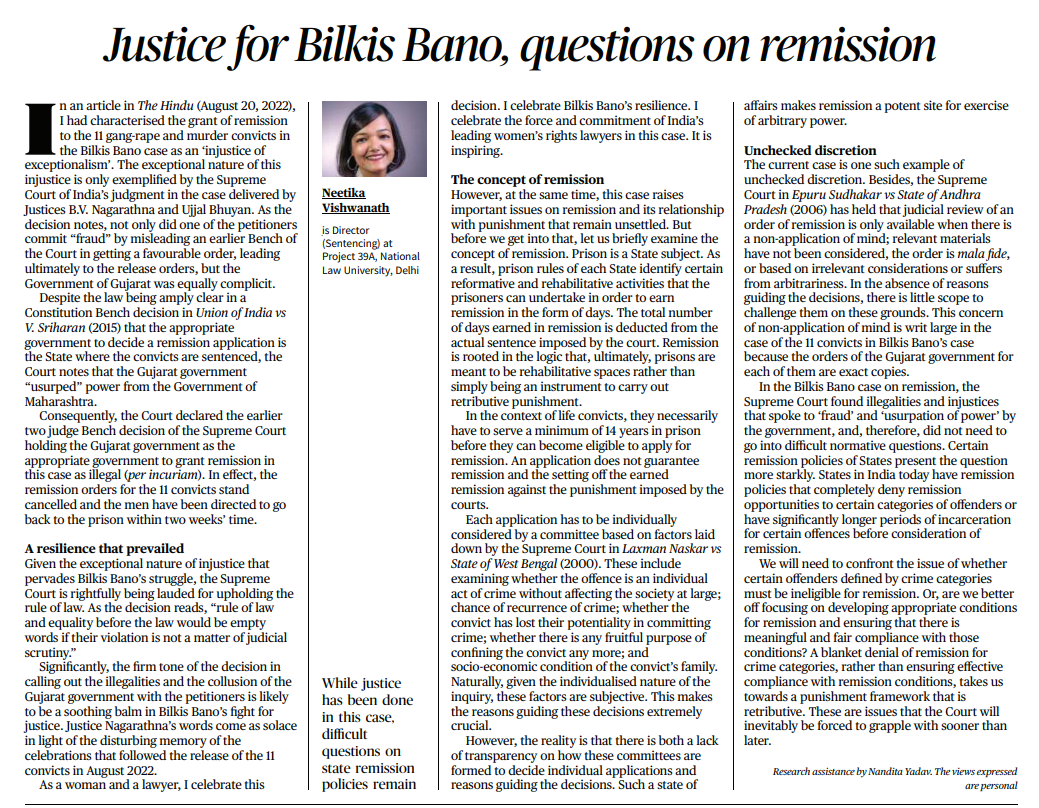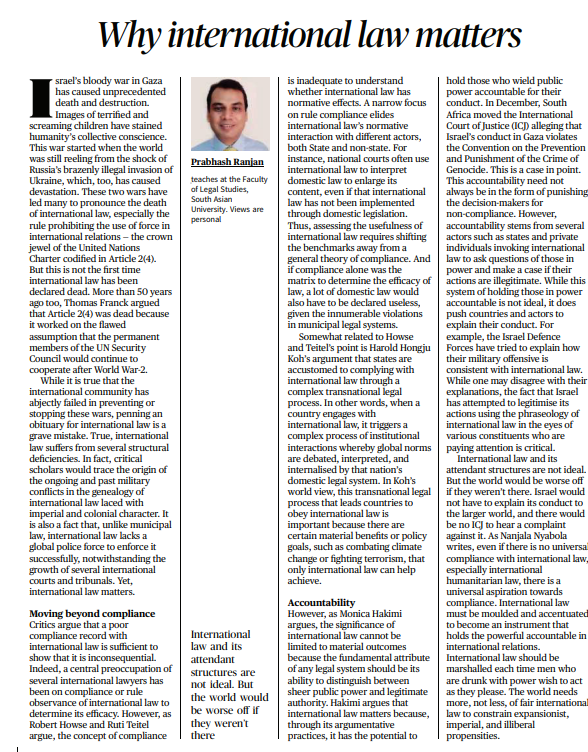Background and Legal Injustices
- The editorial focuses on the recent Supreme Court decision in the Bilkis Bano case.
- Characterizes the remission granted to 11 gangrape and murder convicts as an ‘injustice of exceptionalism.’
- Highlights fraudulent actions by one petitioner, misleading a previous Bench for a favorable order.
- Points out complicity of the Gujarat government, which illegally usurped power from the Government of Maharashtra.
- Praise for the Supreme Court’s Stand
- Commends the Supreme Court for upholding the rule of law and equality.
- Appreciates the firm tone of the decision, calling out illegalities and government collusion.
- Recognizes the decision as a positive step in Bilkis Bano’s fight for justice.
- Emphasizes the importance of judicial scrutiny in preventing rule violations.
- Celebrating Resilience
- Celebrates the resilience of Bilkis Bano in the face of injustice.
- Acknowledges and praises the dedication of India’s leading women’s rights lawyers.
- Expresses inspiration drawn from their commitment to justice.
- Underlines the significance of celebrating the triumph over adversity.
- The Concept of Remission
- Briefly explains the concept of remission as rooted in rehabilitation rather than retribution.
- Highlights that prison rules identify reformative activities for prisoners to earn remission.
- Points out the necessity for life convicts to serve a minimum of 14 years before applying for remission.
- Indicates that remission aims to subtract earned days from the actual courtimposed sentence.
- Remission Process and Challenges
- Outlines the individualized nature of remission for life convicts.
- Raises concerns about the lack of transparency in committee formation and decisionmaking.
- Emphasizes the subjective factors in the decisionmaking process.
- Expresses worries about arbitrary exercise of power in the absence of clear guidelines.
- Unchecked Discretion and Lack of Transparency
- Argues that the Bilkis Bano case illustrates unchecked discretion in the remission process.
- Highlights the identical orders issued by the Gujarat government, indicating nonapplication of mind.
- Discusses the challenges of judicial review without reasons guiding decisions.
- Points out the need for transparency to prevent arbitrary exercise of power.
- Normative Questions on Remission Policies
- Raises questions about whether certain offenders should be ineligible for remission based on crime categories.
- Advocates for a focus on developing appropriate conditions for remission.
- Suggests ensuring meaningful and fair compliance with remission conditions.
- Warns against a blanket denial of remission leading to a retributive punishment framework.
- Future Challenges for the Court
- Anticipates that the court will grapple with issues related to remission policies.
- Foresees challenges when states deny remission to specific offender categories.
- Emphasizes the need for meaningful and fair compliance with remission conditions.
Acknowledges that the court will likely face normative questions in shaping future remission policies.
Security Challenges in India for 2024: An Analytical Summary
PostCold War Paradigm Shift (2022):
- Russian invasion of Ukraine challenges the belief in postCold War peace.
- Violation of borders in Europe contradicts the spirit of the 1976 Helsinki Agreement.
- Nuclear weapon states engaging in conventional warfare raises concerns.
- India’s experience with China along the LAC echoes similar challenges.
- Uncertainty regarding Beijing’s restraint in 2024.
HamasIsrael Conflict (2023):
- Hamas’ audacious attack surprises Israel, revealing tactical acumen.
- Conflict highlights the Palestine issue globally.
- Houthi rebel group exploits lowcost technology to disrupt global shipping.
- Inadequacy of actionable intelligence and anticipation of security exigencies.
- Impact on India and Defense Minister Rajnath Singh’s stern warning.
- NonState Entities Exploiting Technology (2023):
- Utilization of unmanned drones by Houthi rebels challenges maritime security.
- Attacks catch targets by surprise, exposing intelligence and planning inadequacies.
- Inability to anticipate outofthebox security challenges based on technological trends.
- Similarities with historical surprises in Indian conflicts (1962, 1999, 2008, 2020).
- India’s need for improved strategic preparedness and response.
Complex Security Landscape for India in 2024:
- External challenges from China and Pakistan and their strategic cooperation.
- Potential impact of global nonstate entity activities on India.
- Terrorism spike in Jammu as an illustrative example.
- Myanmar developments and their spillover into Indian northeast.
- Electoral dynamics in Pakistan with potential antiIndian fervor.
Challenges in Indian Military and Defense Management (2024):
- Security index influenced by electoral compulsions and funding constraints.
- Lack of objective reviews since the Khanduri report in 2018.
- Radical rewiring of the Indian military with the introduction of theatre commands.
- Impact of the appointment of a retired three-star officer as the second CDS.
- Concerns regarding the Agniveer scheme for young recruits and its impact on combat efficiency.
Uncertainties in Future Acquisitions and Battlefield Environment (2024):
- Difficulty in studying the evolving battlefield environment.
- Challenge of determining the efficacy/vulnerability of conventional platforms.
- Gradual introduction of AI and related technologies in military operations.
- Necessity for security planners to consider scenarios beyond traditional conflicts.
- Testing the nimbleness and bench strength of the next government and higher defense management.
Conclusion:
- Rhymes of history may unfold rapidly, testing India’s security readiness.
- Challenges necessitate informed decisions, adaptability, and strategic foresight.
- The role of technology, global dynamics, and nonstate entities requires careful consideration.
2024 and beyond will demand a comprehensive and dynamic approach to national security.
Context of Recent Conflicts
- Israel’s war in Gaza causing unprecedented death and destruction.
- Impact on children and the collective conscience of humanity.
- Occurring in the aftermath of Russia’s invasion of Ukraine.
- Perception of a breakdown in international law.
Historical Perspective on the Decline of International Law
- Declaration of international law’s death more than 50 years ago.
- Thomas Franck’s argument against the efficacy of Article 2(4) of the UN Charter.
- Flawed assumption about continued cooperation among UN Security Council members.
- Previous instances of declaring international law dead.
Structural Deficiencies in International Law
- Absence of a global police force for effective enforcement.
- Presence of international courts and tribunals without a strong enforcement mechanism.
- Acknowledgment of inherent challenges in implementing international law.
- Recognition of imperial and colonial character within international law.
Importance of International Law
- Caution against prematurely declaring the death of international law.
- Acknowledgment of imperial and colonial character in international law.
- Assertion that international law still matters despite its flaws.
- Emphasis on the need for continued relevance.
Beyond Compliance Normative Interaction
- Critique of a narrow focus on compliance with international law.
- Proposal to shift benchmarks away from a general theory of compliance.
- Recognition of normative interaction with state and nonstate actors.
- Acknowledgment that compliance alone does not determine the efficacy of law.
Transnational Legal Process
- Highlighting Harold Hongju Koh’s perspective on engagement with international law.
- Mention of a complex transnational legal process triggered by countries.
- Connection between global norms, debate, interpretation, and internalization.
- Emphasis on material benefits and policy goals as drivers for compliance.
Accountability in International Law
- Monica Hakimi’s argument on the significance of international law.
- Beyond material outcomes, focus on distinguishing between public power and legitimate authority.
- Example of South Africa moving the International Court of Justice against Israel.
- Importance of holding those wielding public power accountable.
Recent Example of Accountability
- South Africa’s move against Israel for violating the Genocide Convention.
- Illustration of how international law can be invoked for accountability.
- Emphasis on accountability not always in the form of punishment.
- Recognition of various actors using international law to question actions.
Universal Aspiration towards Compliance
- Acknowledgment of the absence of universal compliance with international law.
- Recognition of a shared aspiration towards compliance, especially in humanitarian law.
- Understanding that compliance is not absolute, but an ongoing process.
- Importance of striving for universal adherence to international norms.
Advocating for Strengthening International Law
- Acknowledgment of imperfections in international law is a call to mold and accentuate international law to hold the powerful accountable.
- Necessity of fair international law to constrain expansionist, imperial, and illiberal tendencies.




